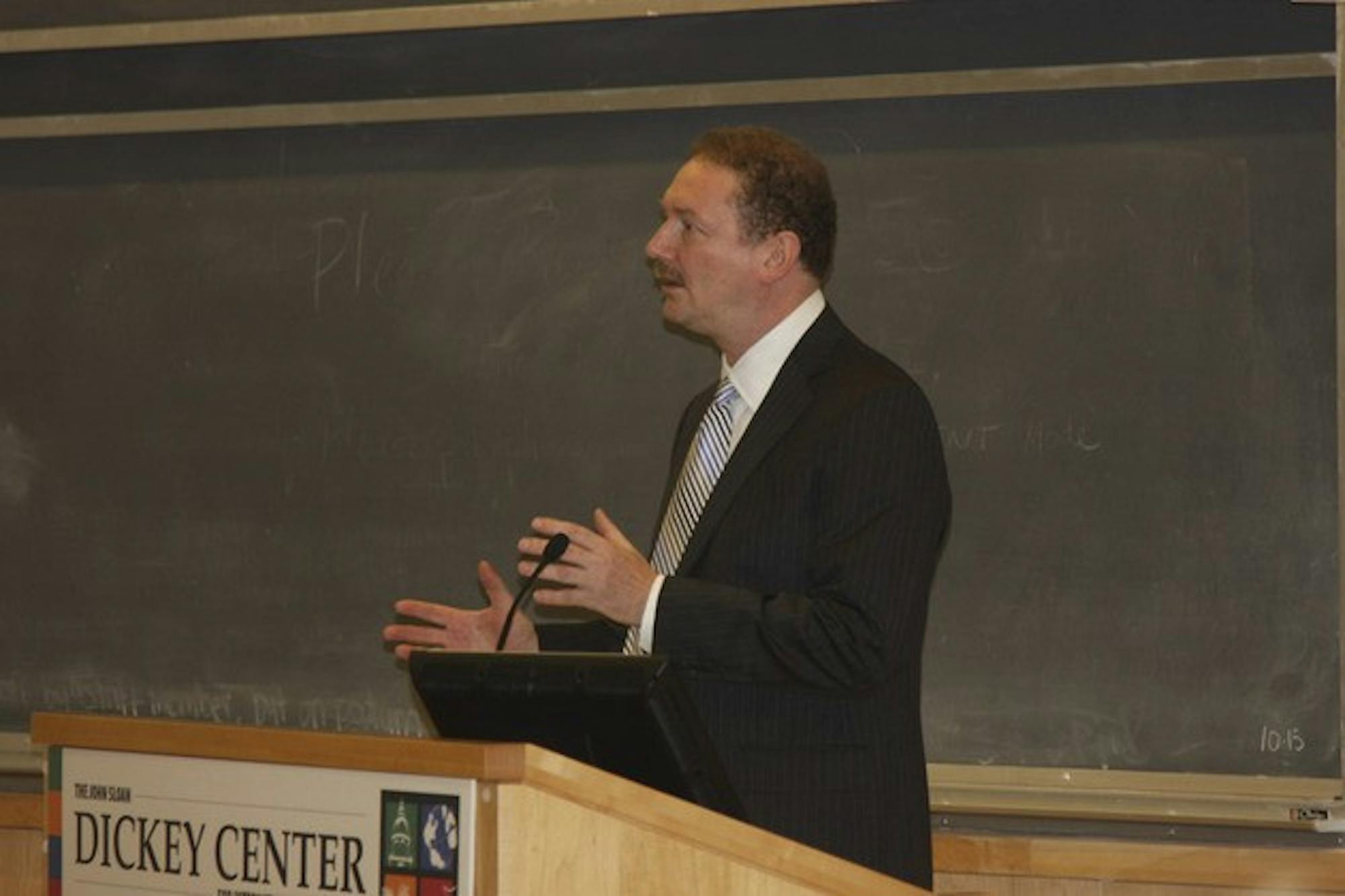The talk, which took place in the Haldeman Center, focused on Libyan history both before and after the beginning of the civil war in February, as well as the difficulties that Libya will face in the future.
Vandewalle began by discussing his work as the political advisor to Ian Martin, the United Nations Special Advisor on Libya. U.N. agencies had prepared seven 70 to 80-page reports that focus on topics such as Libya's political, economic and humanitarian situation. Vandewalle said he helped distill these research papers into a 30-page report and three-page executive summary for U.N. Secretary General Ban Ki-Moon.
"It was, in a sense, a very privileged position to be in," he said. "It was also a wonderful opportunity to instill in the report some of the things that I felt strongly about as we went in preparing this report."
Vandewalle said he emphasized the way the Gaddafi regime has used oil funds to build and maintain an authoritarian regime.
"One of the arguments I've made through my own academic work is that the ability to use the oil money in a patronage fashion is really what affords governments the ability to create these highly authoritarian regimes," he said.
He also said he advocated a peace and reconciliation commission for Libya similar to the one set up in South Africa following the end of apartheid.
Vandewalle then provided some background on Libyan history, beginning with the country's founding as an "accidental state" formed by great powers looking for an air base. After Gaddafi rose to power after a coup in 1969, Gaddafi deliberately destroyed the state's institutions and sought to weaken identity groups such as tribes, according to Vandewalle.
"What the state did in Libya is, on the one hand, distribute money hence why I sometimes refer to it as a distributive state while on the other hand coerce its population," Vandewalle said. "Most of the institutions we in the West take for granted, the regulatory institutions between citizens and the state, did not emerge and were deliberately destroyed by Gaddafi."
The lack of state institutions or a civil society will make it difficult for the state to rebuild itself following Gaddafi's departure, he said.
"This is a country that faces an enormous amount of problems, in part because it never really functioned as a true state. It's never certainly functioned as a nation with a consensus of what the political community should look like," Vandewalle said. "All of the civil society organizations have been destroyed by Gaddafi's regime over a period of 40 years."
He added that Gaddafi destroyed civil society to the point that stamp collecting clubs were prohibited in Libya due to the regime's fears that such groups would become politicized suppression similar to what once took place in the Soviet Union.
The international community responded to the conflict in Libya first economically and then militarily, he said. The United Nations passed two resolutions in 1970 and 1973 which froze assets to Libya and instituted a no fly-zone that would allow the North Atlantic Treaty Organization to respond, Vandewalle said.
While the United States was initially reluctant to get involved in the conflict militarily, the decision by the Arab League to support NATO airstrikes against Gaddafi forces led President Barack Obama to support the intervention, he said.
Vandewalle also discussed the divisions within the Transitional National Council, a "proto-government" set up by rebels in the eastern part of the country. The TNC, which is largely comprised of ex-Gaddafi officials, faces "questions that have never really been resolved," Vandewalle said. In addition, the TNC mostly includes people from the "liberated" Eastern providences, calling into question its claim that it represents all of the Libyan people.
As an example of these divisions within the TNC, Vandewalle discussed the recent assassination of Abdul Fatah Younis, the former Gaddafi interior minister, who defected to the rebels and became commander of their armed forces. Other members of the rebel forces killed Younis, thereby angering members of his Obeidi tribe. The TNC cabinet was forced to resign to appease the Obeidi tribe, Vandewalle said.
Other fault lines within the TNC include divisions between Islamists and secularists and between younger and older fighters, according to Vandewalle.
"It was clear that all these fault lines were occurring very, very rapidly," he said. "The big question came just before the recent uprising: whether or not the TNC could really survive as the proto-government for Libya."
The TNC, although it has made progress, still faces significant challenges it must address before taking control of Libya, Vandewalle said.
"On the one hand, the TNC was really becoming this proto-government and had built up capacity during the two months that I observed it and made an enormous amount of progress and was not afraid to ask external expertise to come to Bengazhi and talk to them," Vandewalle said. "At the same time, it became very clear that these doubts about who the TNC represented and whether or not the TNC could really be representative of the country as a whole resurfaced."
Libya's near future is likely one of continued instability, as the TNC and the international community attempt to rebuild the state, Vandewalle said.
"The kind of challenges that the new regime will face in Libya will truly be enormous," he said. "They will be asked to build a state and really build the institutions truly for the first time in Libyan history."




